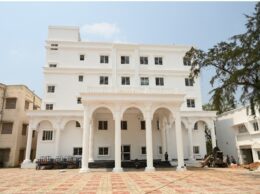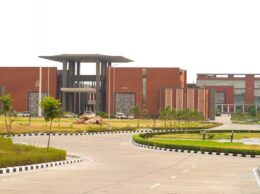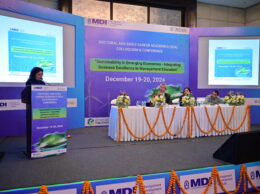GUWAHATI : Indian Institute of Technology Guwahati recently concluded a three-day International Conference, “Unraveling Indian Knowledge Across Asia (UNIKAA) 2024,” bringing together experts to explore the connections between ancient Indian wisdom and modern challenges.
The inauguration ceremony was graced by the Hon’ble Governor of Assam, His Excellency Shri Lakshman Prasad Acharya, as the chief guest, along with distinguished guests including Shri Phurpa Tshering, Vice Consul of the Royal Bhutanese Consulate General in Guwahati, and Prof. Brahma Deo from IIT Bhubaneswar. The event was opened with speeches from Prof. Devendra Jalihal, Director, IIT Guwahati, Prof. Uday Shanker Dixit, Chair of the conference, and Prof. Lalit M. Pandey, Organizing Secretary, who outlined the conference’s vision and its focus on the significance of local languages and interconnected knowledge systems.
The program began with a welcome address by Prof. Dixit, followed by an outline of the conference’s vision by Prof. Pandey.
During his address, Prof. Jalihal highlighted the interconnectedness of the Indian knowledge system and the importance of local languages.
The guest of honor, Prof. Deo, emphasized the significance of ancient Indian knowledge, especially in fields like metallurgy, and its relevance today. Shri Phurpa Tshering praised India’s contributions to global knowledge, noting the importance of traditions like yoga, Ayurveda, and astronomy. He also highlighted the deep spiritual connection between Bhutan and India, remarking that for every Bhutanese, visiting Bodh Gaya is a cherished pilgrimage.
Representing the Ambassador of Indonesia, Dr. Aldrin Herwany, Education and Cultural Attaché, shared insights into the shared knowledge systems of Asia.
In his keynote address, Governor Lakshman Prasad Acharya emphasized the need to integrate India’s ancient knowledge systems with modern science and technology, particularly as India and Asia move toward a new era of development. He praised IIT Guwahati as a hub of research and innovation and commended the conference for fostering collaboration between scholars from diverse fields. The Governor underscored the global influence of texts such as the Vedas, Upanishads, Ramayana, and Mahabharata, emphasizing their timeless teachings on morality, duty, and truth. Quoting the philosophy of “Vasudhaiva Kutumbakam” (“The World is One Family”) often emphasized by Prime Minister Shri Narendra Modi, he referenced India’s adherence to the peaceful principles of Buddhism over paths of conflict.
Concluding his address, the Governor spoke passionately about environmental conservation and character building, quoting, “निर्माणोम् के पावन युग में हम चरित्र निर्माण न भूलेम्! स्वार्थ साधना की अमाधि में वसुधा का कल्याण न भूलेम्!!” His remarks highlighted the importance of bridging ancient wisdom with modern science for societal progress.
The conference featured over 130 oral presentations and 30 invited lectures, with participants from countries such as Bangladesh, Bhutan, Indonesia, Malaysia, and the USA. The sessions covered diverse themes, from Ayurveda and yoga to mathematics, astronomy, and artificial intelligence. Discussions focused on how modern technology can help preserve and explore ancient knowledge systems.
The interdisciplinary nature of the conference was evident, particularly in discussions on how modern technology, such as data science and artificial intelligence, can be used to preserve and explore ancient knowledge. Sessions also delved into the philosophical traditions of ancient scriptures like the Ramayana and Mahabharata, emphasizing their continued relevance today.
A panel discussion on “The Importance of Indian Knowledge Systems in the Contemporary World” was one of the conference’s key highlights, fostering in-depth discussions and potential future collaborations.
The valedictory session featured the Hon’ble Speaker of the Assam Legislative Assembly, Shri Biswajit Daimary, as the chief guest, along with Prof. Sukumar Mishra, Director of IIT (ISM) Dhanbad, and Prof. Varadraj Bapat from IIT Bombay, as guests of honor.
Prof. Mishra highlighted the importance of ideas in driving innovation, inspired by ancient teachings. Prof. Bapat stressed the primacy of knowledge acquisition over language and shared insights on India’s historical contributions to the global economy.
In his concluding remarks, Shri Daimary welcomed delegates to Assam and urged them to explore the region’s rich cultural and historical heritage. He emphasized that education should instill cultural values and ethics alongside academic achievements. He also encouraged the organization of more such conferences in the northeastern states to celebrate India’s rich cultural diversity and promote the vision of Akhanda Bharat.









